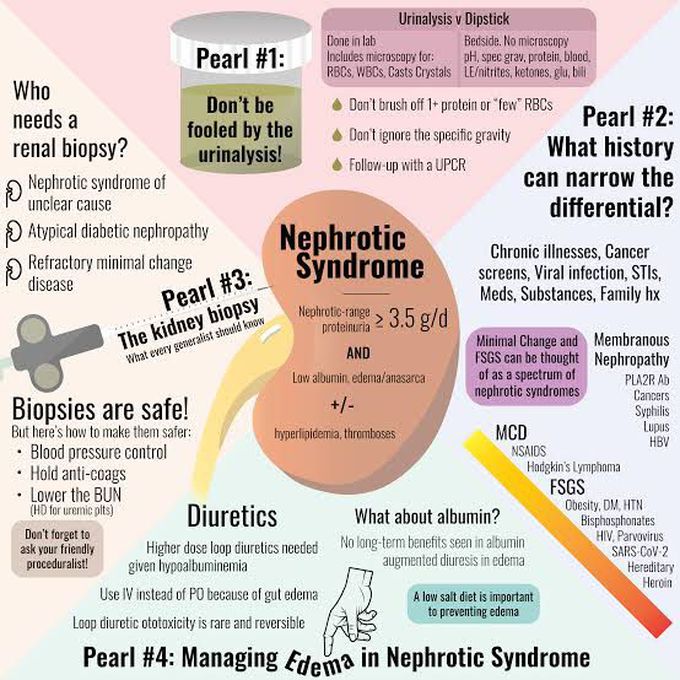


Causes of nephrotic syndrome
Kidney diseases often damage your glomeruli. The diseases target your glomeruli, though healthcare providers and medical researchers aren’t sure why. Damaged glomeruli are the primary cause of nephrotic syndrome. These diseases include: Amyloidosis. This is a disease in which amyloid proteins build up in your vital organs. Amyloidosis most commonly occurs in your kidneys, affecting their ability to filter. Diabetes-related nephropathy. “Nephropathy” means that your kidney isn’t working properly. In diabetes-related nephropathy, diabetes causes damage or dysfunction to one or more of the nerves in your kidneys. It typically causes numbness, tingling, muscle weakness and pain in your affected area. Focal segmental glomerulosclerosis (FSGS). In FSGS, scarring affects small areas (segments) of some of your glomeruli. It may cause swelling, kidney failure and loss of proteins in your pee. Lupus. Lupus is an autoimmune disease that causes inflammation, swelling and pain throughout your body, including your kidneys. Membranous nephropathy. In membranous nephropathy, your body’s immune system attacks the filtering membranes in your kidneys. Minimal change disease (MCD). This is a type of nephropathy in which your kidneys aren’t working properly. However, a kidney biopsy shows little or no damage to your glomeruli or kidney tissue. MCD may occur at any age, but it’s most common in children.
Living with Lupus is often a battle not just against the illness itself, but also against the emotional weight of uncertainty, fatigue, and the toll of long-term medications. For one courageous woman, that battle began in 2013. Diagnosed after Lupus had already affected her joints and internal organs, she was quickly placed on medication that initially helped. But as time went on, her health declined again this time with more frequent flare-ups and increasingly difficult side effects. Like many others with chronic illness, she faced the crushing weight of hopelessness. Each day became harder than the last, and conventional treatments no longer offered the comfort they once did. But in March 2020, at her lowest point, she made a decision that changed everything.Out of desperation and with a healthy dose of skepticism she turned to NaturePath Herbal Clinic, hoping their natural Lupus treatment might offer at least some relief. What happened next went far beyond her expectations.After completing a six-month herbal program, her flare-ups stopped entirely. Her energy returned. The chronic pain that had defined her daily life began to fade. For the first time in years, she felt like herself again. Not just alive but truly living.Her story is not just one of healing; it’s one of resilience, open-mindedness, and the courage to try something new when all else fails. By sharing her journey, she hopes to offer something priceless to others living with Lupus: hope.This treatment has been a true breakthrough for her. If you’re searching for a safe, natural, and effective alternative, I genuinely recommend giving this a chance.”www.naturepathherbalclinic.com or email them at info@naturepathherbalclinic.com


